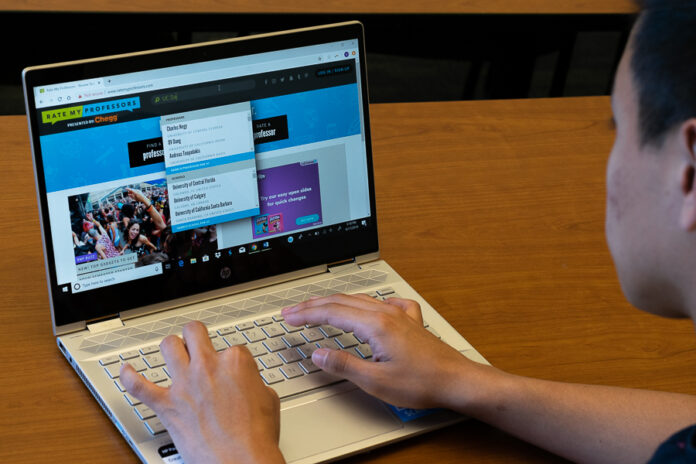Through RateMyProfessors.com students can evaluate professors online
“Awesome, Good, Average, Poor, Awful” — all ratings available to assign to professors on a website students know well: RateMyProfessors.com.
Founded in May 1999, the website allows college students to rate professors and institutions from America, Canada and the United Kingdom, according to the website.
To use the site, one can search for either the university and then the specific department to find a professor, or the name of the professor. Individuals can then read reviews left by others or leave a rating themselves. Professors are rated on a scale of one to five, based on overall quality and difficulty. Students can also leave comments about what their opinions were of the professor and the class. Tags can also be added about common traits often seen in many professors.
“Most of the professors here at UC Davis are about three stars and above,” said first-year biochemistry and molecular biology major Katrina Matthews.
Students like Henna Kaur, a first-year undeclared student, said that recurring themes on comments left for Davis professors include the amount of homework and reading, difficulty of tests, how the professor grades or how good of a lecturer the professor is.
Kaur said that like other students at UC Davis, she looks up professors on the website during the process of choosing her classes for the next quarter.
“I want to have a good professor and that will influence what classes I will chose,” Kaur said. “So usually I will look at the ratings and see what people have to say about them.”
Matthews said that she uses the website to find classes with attractive workloads based on the reviews of other students, especially when she is trying to create a balanced schedule.
“I think it is a good tool just because it kind of gives you an idea of what the class is like before you go into the class for the whole quarter,” Matthews said. “Especially if you are taking a heavy load, especially for STEM majors, if you want to pick a GE, you want to pick one of the easier ones if you are taking multiple STEM classes at a time.”
Jaime Fisher, a professor in the German and cinema and digital media departments, said he used to check RateMyProfessors.com more often but does not anymore because he hasn’t received many ratings recently.
“My ratings are more or less positive, but not perfect, so I don’t worry about it,” Fisher said.
The negative reviews Fisher has found on the website about himself mostly has been about the class rather than his teaching.
“Usually the complaints are about the material, but of course we feel obligated to teach certain types of material,” Fisher said. “If there were more problematic things, I might check it more often.”
RateMyProfessors.com is not a perfect website. According to Fisher, the ratings do not give specific assessments or suggestions about the class material, which would be most helpful to him and other professors.
“It’s much more general of whether the professor is effective or not,” Fisher said.
Also, who chooses to leave reviews is a self-selective process, making it difficult to get a more accurate representation of how all students feel about the class, according to Fisher.
“You may feel like you are more confident in the subject than everyone that is rating the subject, and they may give poor feedback to actually a professor that you would enjoy or a professor that you would understand based on their lecture style,” Matthews said.
According to Peter Wainwright, a professor in the department of evolution and ecology, receiving feedback about a class is best when it comes from a large student sample size.
“Without large samples from classes, it runs the risk of not being representative of student experiences,” Wainwright said. “So one major issue is that, at least in my case, only a very small fraction of students participate.”
As long as enough students write reviews, Wainwright said that he thinks the website can be fairly accurate in providing students with their peer’s impressions of professors.
“As long as you use it that way and there are enough responses, I think it should be an accurate reflection of student impressions and student evaluations of instructors,” Wainwright said.
Another drawback Wainwright has found is that students could use the website maliciously which could be complicated and awkward to back out of.
“I feel like some people go on there after they figure out that they are going to fail the class after the second midterm and then they put a really bad rating for the professor,” Matthews said. “But typically, I think it is pretty accurate in terms of their teaching style.”
For Fisher, he said that he spends more time looking at the actual class evaluations administered by the university at the end of each quarter because he finds them to give more useful feedback that is specific to his classes.
“We do those end of quarter surveys, which are pretty much the same thing just more formally,” Kaur said. “That would be a way to see what students really think.”
Overall, Fisher said that receiving any feedback about a professor’s teaching is important and valuable.
“Transparency about our teaching is good,” Fisher said. “I don’t know whether RateMyProfessors.com is the best vehicle for it. It’s probably a flawed vehicle because of the self-selection problem, but probably some vehicle is better than none.”
Written by: MARGO ROSENBAUM — features@theaggie.org





